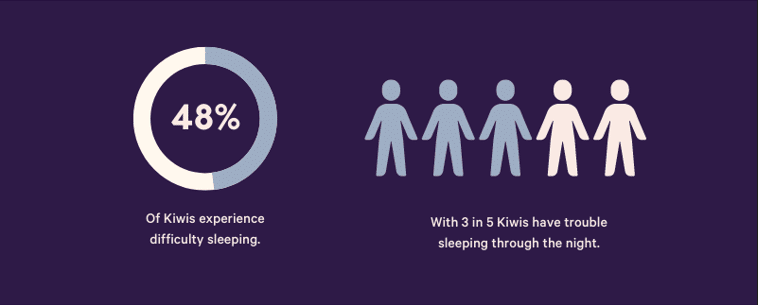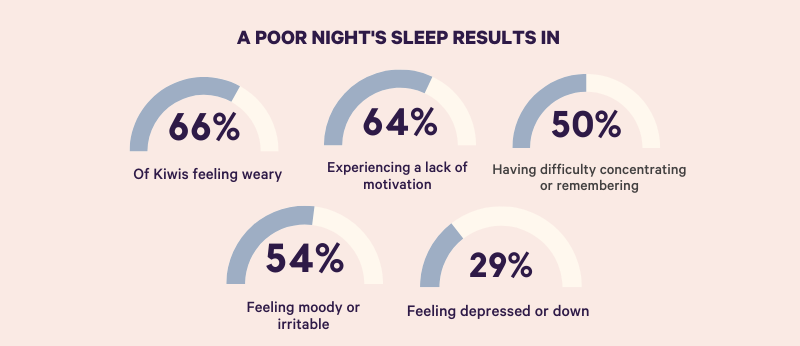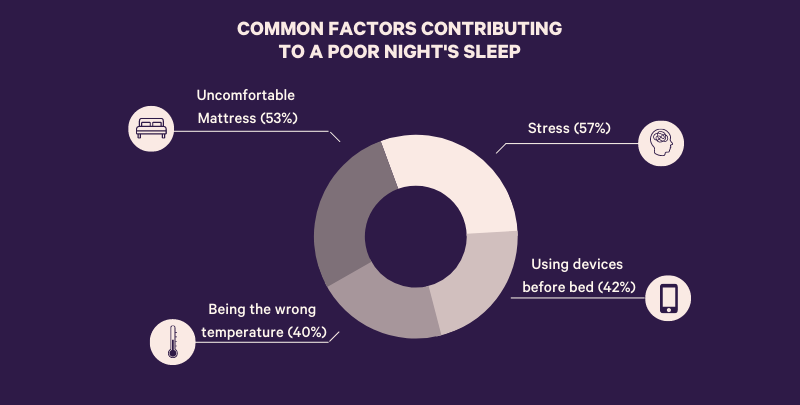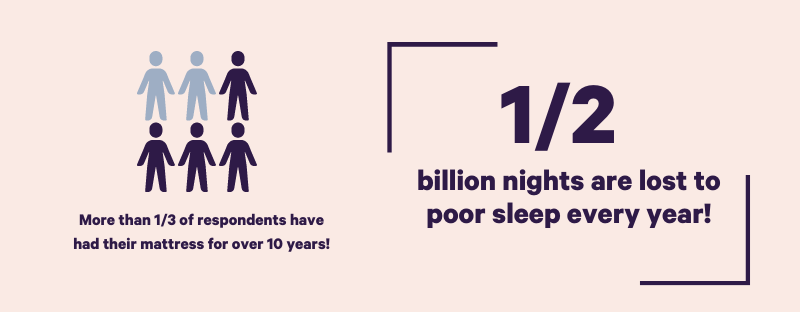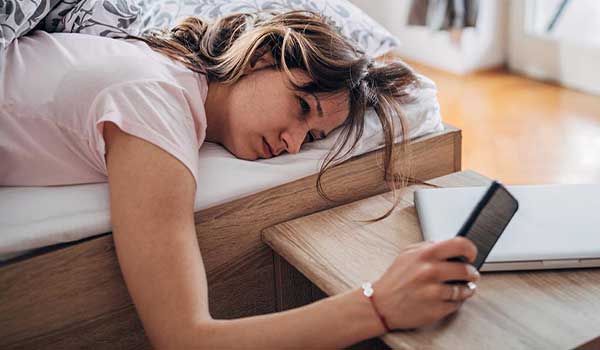
2022 Sleep Week Survey Results
Sleepyhead recently conducted an online survey to find out more about the state of sleeplessness taking place in New Zealand, A staggering 13,000 people responded making it New Zealand’s largest sleep survey ever and offering some vital clues about what’s happening for many of us throughout the night.
How quickly do you fall asleep? Do you sleep through the night? Or do you just dread bedtime? If the answer is yes to any of these, you’re likely just one of the 48% percent of Kiwis experiencing sleep difficulties. Read on to see what other struggles are common for Kiwis at bedtime. The survey also raised funds for The Mental Health Foundation, funds that will help support, and change Kiwi lives for the better.
So, down to the findings. Results showed that three-in-five adults are having trouble sleeping through the night (63%) and just over half experience restless sleep (56%). Nearly half have trouble falling asleep (47%) and just over one-third wake too early and can’t get back to sleep (37%).
Poor and inconsistent sleep impacts your daytime functioning and mental wellbeing. A night of poor sleep has 66% of those who took part feeling weary, 64% experiencing a lack of motivation, and 50% experiencing difficulty concentrating or remembering. For nearly half the sample, dissatisfying sleep leaves them feeling moody or irritable (54%). Almost a third (29%), indicate that poor sleep affects their mental health leaving them feeling down or depressed.
Bearing in mind the difficulties people are having at night and the daytime consequences, it’s not surprising only 29% of Kiwis in the study feel confident about getting a good night’s sleep. The majority were not sure whether they would sleep well (45%) and just over a quarter had little or no confidence about it (27%).
Sleep Easy Author and Sleep Coach Bernice Tuffery says the results reflect findings from other studies highlighting the prevalence of sleep issues in New Zealand. The lack of confidence in sleeping is concerning. Now more than ever, people need to feel confident about getting a good night’s sleep and they need solutions and support that will help them to sleep well.
“Sleeping well makes such a difference to our lives – physically, mentally and emotionally. Satisfying sleep quality, quantity and consistency strengthens our immune system and fortifies our resilience. With stress levels running high, we need to consciously create and maintain habits that are conducive to getting a good night’s sleep.”
So, what’s going on? Why are so many of us suffering poor sleep?
When asked what was contributing to their difficulties with sleep, 57% of respondents claimed stress was a culprit. Other factors believed to be to blame included using devices before bed (42%), being the wrong temperature (40%) and having an uncomfortable mattress (53%).
More than one-third of respondents have had their mattress for over 10 years. Those who’ve had their mattress for more than eight to 10 years are twice as likely to have trouble sleeping (64%) compared to those who have a near-new mattress (33%).
While many respondents might not be enjoying their optimum sleep, they want things to get better. Almost everyone in the study (97%) agreed that they’d like to improve their sleep. Almost a third (30%) have taken some sort of action to improve their sleep, but most people simply don’t know what to do about it (67%). When asked about seeking help for their sleep, 57% said they don’t do anything and just ‘tough it out’.
There are simple, practical things we can do to support our sleep health and create the conditions for a better night’s sleep.
Here are our top tips that align with the five key reasons participants in the study believe they’re not sleeping well – too much stress, an uncomfortable bed, using screens before bed, the wrong temperature, and irregular bedtimes.
De-Stress – Give yourself permission to wind down
It’s okay to acknowledge your own stress and work out what you personally need to take some pressure off and look after yourself through a challenging time. Be honest with yourself about what you find relaxing and calming – make time to wind down in the hour before bed. Bio-chemically, it’s much easier for sleep to naturally occur when your body and mind are calm.
Reading a book, conscious breathing, meditating or listening to music are great ways to settle after a busy day.
Sleep Foundation – Is your mattress match, right?
Your bed can become your best cue for sleep instead of a cue for avoidance and wakefulness. Could it be time to reassess your mattress? Older mattresses (those over eight years old) can contribute to back pain and allergies, and can transfer more motion making sleep more disruptive.
Go screen-free – Gift yourself an hour of screen-free time before bed
Step away from the screens. Screentime before bed hinders sleep in two ways. The light from backlit devices like phones, TVs and computers targets your eyes and interferes with your body’s natural sleep hormone, Melatonin. Too much screen time tends to stimulate our minds making it harder to nod off.
Get the temperature right – Not too hot, not too cold
Balance in all things. Core body temperature can be a major contributor to falling and staying asleep. Your body temperature naturally drops in the evening to prepare you for sleep. If your room is too hot your body can’t drop those essential few degrees. And being too cold prevents sleep too. As a guide, the National Sleep Foundation recommends a room temperature of about 18 degrees Celsius.
If you’re an ‘over heater’, have a look at a mattress with new KulKote heat-regulating technology to help you achieve a more comfortable sleep temperature.
Get regular – Routines win
Set a regular bed and wake time, one that works in your daily life. Keep it consistent on weekdays and weekends. It sounds boring we know, but late nights and sleep-ins mess with your body clock. Our bodies thrive on routine so try to work with your body rather than against it. Let it work to balance your natural melatonin level so it’s higher at night when you need it to fall asleep.
An afternoon nap is a thing of joy, but if you do suffer from poor sleep, it’s best to avoid napping during the day. If absolutely essential, try to keep your nap brief (under 30 minutes) and wake up by 4pm.
Results were aggregated by an external agency, Baseline Consultancy.
Read More:
Are You Having Trouble Sleeping?





